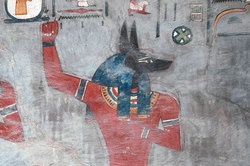 Archaeologists explored the catacombs South of Cairo, near the temple of Anubis, God of death with the head of a Jackal, when found almost 8 million mummified dogs. Some puppies at the time of mummification was only a few hours or days old. Archaeologists explored the catacombs South of Cairo, near the temple of Anubis, God of death with the head of a Jackal, when found almost 8 million mummified dogs. Some puppies at the time of mummification was only a few hours or days old.
The main author of the study Paul Nicholson and his colleagues explored the catacombs countless hours exploring their stone walls and mummified content. According to our information, the buildings were erected around the IV century BC stone times the Ypres tier of the Eocene, which has an age of about 48-56 million years. In favor of these findings and declares that on the ceiling of the catacombs was found an unusual fossil of a Grand, historic marine vertebral age more than 48 million years.
The researchers analyzed all available corners of the old buildings, where they were seen mummies jackals, foxes, falcons, cats and mongoose, but still 92% of the remains belonged specifically to dogs. It is not clear why other animals were also buried among dogs. Scientists believe that this is based on some mythological roots.
During the study of the remains, the researchers found that some of the puppies were only a few hours or days old at the time of mummification, which leads one to the idea that they were bred for this cult. "It is unlikely that they were killed by physical action: there is virtually no evidence of broken necks, often found in cat mummies. Most likely, they were simply taken away from mothers and pups died of starvation and dehydration. At the same time, we have identified and mummy old dogs, buried more sophisticated and festive way. These animals probably lived in the temple" - quoted by Nicholson Antiquity.
Many of the mummies have survived in very poor condition: they either crumbled or were stolen by raiders or farmers (who most likely used them as fertilizer). And yet archaeologists have found enough evidence that the animals used in the cult of Anubis, were a major part of the Egyptian economy. Many historians agree that the churches and catacombs of the city stimulated trade and Commerce, in a way they can be called the basis of global tourism.
sections: Society, World News
|